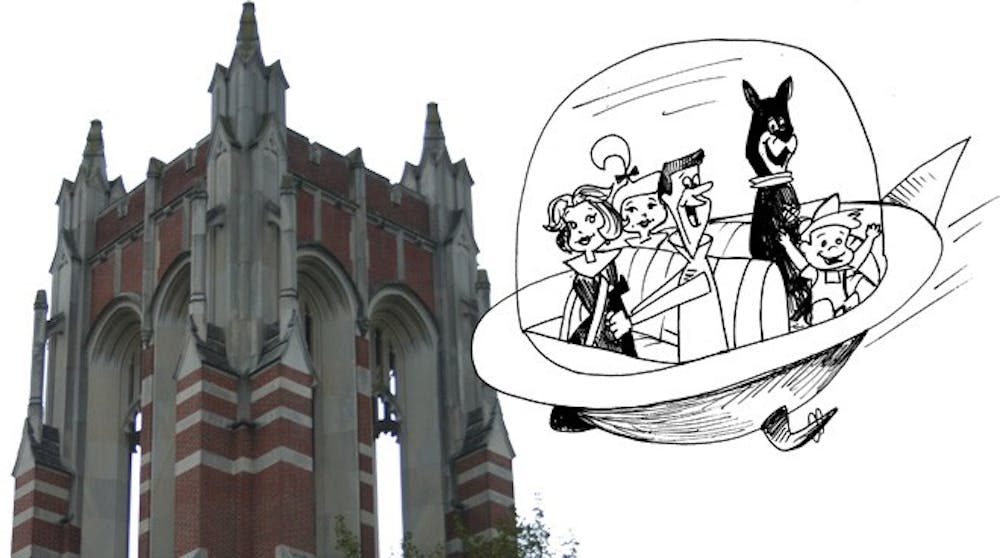My School of Arts and Sciences curriculum has taken me through quite a few buildings and disciplines across campus, but it has never forced me to explore the other two undergraduate schools. For my second column, I braved the trail to the Robins School of Business. My second-to-last column proved time to unravel the mystery enveloping the Jepson School of Leadership Studies.
My first encounters with "Jepson" used to cue a catchy song in my head: "Meet George Jetson. His boy Elroy. Daughter Judy. Jane, his wife." I eventually realized I was a letter off the animated sitcom — ruh-roh — but was the 2062 setting so inapt?
The digital screens mounted on the walls, which flash a Jepson welcome, always appeared a bit futuristic. Someone also convinced me once that it was the computer center of campus, even persuading me to wake up at dawn to trek there on the morning of class registration freshman year because she swore our codes would transmit faster if we were closer to the source.
Returning to our dorm to hear hallmates rejoicing about securing two of three open spaces in a popular class proved that theory to be absolutely false. But leadership and the future — could the two be any more entwined?
The concept of leadership studies itself, though, had always struck me as exceedingly abstract. I couldn't graduate without discovering: What in the world are leadership studies? Apparently I was not alone:
"Usually everyone goes, 'What's that?'" senior leadership studies major Jacki Raithel said.
Professor Don Forsyth confirmed by e-mail, "Jepson is mysterious."
Conversations with Jepson faculty, staff and students debunked my initial theory that the school was a leadership training camp. This was disappointing because I had been imagining a bustling secret society behind closed classroom doors, complete with entry passwords, special handshakes and a dress code emulating favorite presidents, rulers, movers and shakers.
Also home to the math department, the Help Desk, many A&S classes and computer labs galore, the Jepson building itself was not as daunting and isolated as the B-School had been. But always suspicious of its hidden world, I half-expected to see a couple of George Washingtons, some Nelson Mandelas and perhaps one or two Gandhis when I sat in on my first leadership class last week. Maybe even a Timothy Kaine — oh wait, he's already a Jepson professor.
Instead, I opened the door and was confronted by sweatpants, sweatshirts, fleeces, sneakers and yoga pants. Various students ate and surfed the Web during class, or discussed before class how they hadn't read the book, hadn't bought the book or were preparing valuable "bullshit" to turn in as papers.
Hey, I could find this in my plain old A&S classes, I thought. Fear was fast to follow, as alarm crept into my mind — "These are our future leaders?!" I asked myself in panicked disbelief. The professor did vaguely resemble Abraham Lincoln, but even he left while the students took a quiz and returned with, not a Nobel Peace Prize or Medal of Honor, but a blended frappuccino topped with whipped cream.
But as the class unfolded, I felt reassured. The professor charted a subtle but skilled course of prodding the students with questions they hadn't memorized the answers to, and therefore had to generate ideas for themselves, and underlining key concepts in the reading to ensure nothing was missed. Classes are almost 100 percent discussion-based and focus more on big concepts than the memorization of facts, Raithel said. As the professor teased out the influence of groups besides elected officials on city politics, the concept of leadership studies became more concrete.
Enjoy what you're reading?
Signup for our newsletter
I even got a chance to practice my own leadership studies after I left class and found myself walking behind President Edward Ayers. As I studied the way he sheltered a student with his umbrella, my new insight forced me to question whether this displayed his kindness, generosity and approachability (most likely) or merely served as a calculated act of publicity engineered to influence his followers' perception of him.
As the Jepsons explained to me: Jepson is not for training leaders. Yes, some students have their sights set on leadership positions. But leadership studies instead delves more dynamically into the processes by which people influence each other, which anyone tied to reality could benefit from, Dean Sandra Peart said.
In addition to its intellectual appeal, leadership studies has a practical application because leadership is an all-pervasive phenomenon. People can influence others and be influenced from positions of flatness and equality - you don't have to be a dean, Peart said. Learning to think critically is crucial not just for being a leader, but also for identifying what we want to see in our leaders —elected officials, bosses, etc. — said Kerstin Soderlund, associate dean for student and external affairs.
Described as the antithesis of narrow, leadership studies draws professors from eight different disciplines. This creates a uniquely integrated and interdisciplinary experience, Peart said. Instead of looking at many questions from one particular view like most majors, the Jepsons look at one concept — leadership — from many lenses, Soderlund said.
Faculty is more interested in looking at leadership in the creative sense — not maintaining the status quo — professor Thad Williamson said. The Jepsons study how humans come together to organize into communities that function and make change that wouldn't happen otherwise. Leadership is not about the leader — it's about the group functioning. ... I felt pretty ignorant for asking whether it was "the study of, like, government."
But now that we cleared that up, why is it important? First, two months from graduation, I've realized I never took any courses outside my majors, minor or general education requirements. I don't regret charting what I thought was the standard overachieving Richmond course of having two majors and a minor, but I wish I had heard earlier than Saturday that the Richmond liberal arts curriculum was not designed for this, according to a friend's conversation with a dean. I think when graduation comes I'll be ready, but another semester auditing or taking random classes pass/fail would be pretty amazing.
So for those of you who have time, consider it. With minimal or no prerequisites, leadership classes are open to practically any student, Peart said. Leadership provides something new, since most majors tend to be extensions of elementary and high school subjects, Raithel said.
Indeed, I did feel more aware of a new area of thought from just an hour and a half of class and a couple of conversations. Imagine what a whole course would bring, and not just in leadership, but in any discipline you've never exposed yourself to.
Second, and perhaps more importantly, it is crucial for all of us — regardless of our majors — to consider the ways we influence others or receive their influence. As I hope I have conveyed in recent columns, our influence on one another is profound. Consequently, we must tread carefully and critically.
Once we roll out of here with college degrees — or, considering Richmond's workload, more like collapse just after the finish line — we must be careful with how we enter positions of influence: as professionals, as parents or, as Peart pointed out, simply as peers. Simultaneously, we must also be critical by constantly questioning how we are influenced. There is as much to learn from failed leaders as from successful ones, Soderlund said. Finally, both careful and critical tasks require borrowing Jepson's focus on ethics, which Peart, Soderlund and Williamson all stressed.
Part of me still suspects that the students in the class I visited waited for me to leave to launch into top-secret mode — drafting amendments to the Constitution, proposals for world peace and plans to take over the universe "Pinky-and-the-Brain" style — and I sometimes still look for Elroy circling the Jepson tower in the Jetson family's flying saucer. But the saner part knows my focus should be at eye-level: How do we want to be influenced and how do we want to influence others?
Credited in the Dean's Report as the first institution of its kind in the world, Jepson asks us all how we can be similarly innovative, while never straying from our ethics. Maybe I'm naive, but I'd say that's pretty worthwhile.
Contact opinion editor Maura Bogue at maura.bogue@richmond.edu
Support independent student media
You can make a tax-deductible donation by clicking the button below, which takes you to our secure PayPal account. The page is set up to receive contributions in whatever amount you designate. We look forward to using the money we raise to further our mission of providing honest and accurate information to students, faculty, staff, alumni and others in the general public.
Donate Now



